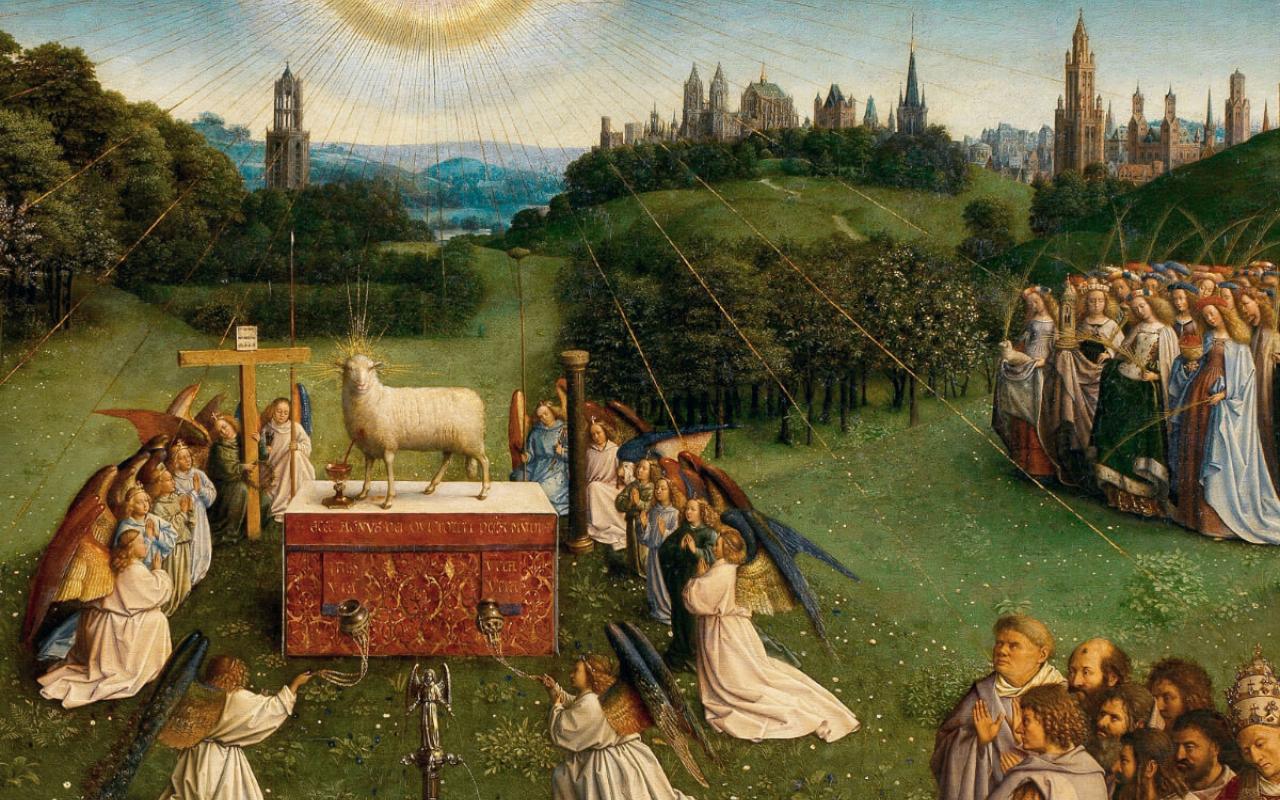
Catholic and secular universities are founded upon strikingly different assumptions concerning the existence and action of God, the proper bases of knowledge, and the doctrine of the Fall.
A detailed examination of the differing philosophical assumptions of these two educational institutions, Christian and Enlightenment, would go beyond what is here useful. What follows are three key differences that can provide a kind of shortcut for perceiving the contrast, which in turn might allow questions of a practical nature to arise. These differences of principle involve: (1) the existence and action of God; (2) the proper bases of knowledge; and (3) the doctrine of the Fall.
1. Concerning the existence and action of God
A Catholic university does not begin with universal doubt, an Enlightenment ideal that is probably impossible to attain even if it were desirable. Rather, the Catholic university arises out of a living organism, the Catholic Church, and assumes as the basis of its intellectual endeavor the truths upon which the Church is founded. The Catholic university starts with the existence of a God who created the universe as an ordered cosmos and who has assigned a special role within that cosmos to humanity. It accepts the doctrines stated by the creeds and set forth in the Sacred Scriptures. These function as first principles of thought for the university’s intellectual project in all its dimensions. When medieval Oxford chose as its motto "Dominus Illuminatio Mea" – "The Lord is My Light" – the Oxford masters were not engaging in a pious devotional exercise. Rather, they were making clear the principles upon which they were basing their intellectual edifice; they wanted their work to correspond to the truth of things.
The Catholic university’s insistence on first principles of reason and revelation does not mean that it does not investigate those principles. It works to understand and purify them; it examines them philosophically and theologically; it pursues questions and difficulties that may arise from holding them; and it devises ways of thinking and of ordering knowledge that can aid in an ever better grasp of reality. Beginning with such first principles does not theoretically lead (and has not historically led) to the suffocation of intellectual activity. The reverse is true. Without strong and clear first principles it is impossible to develop traditions of intellectual life that allow a proper development of the mind and a fruitful engagement with the truth of things.
Working from its understanding that the world has a Creator who is the source of truth and goodness, the Catholic university has a clear foundation for teaching certain perennial truths. It holds that the world has an inherent meaning beyond the subjective experience of any one individual or of any particular society; it confidently teaches that moral norms expressing goodness and justice are rooted in an unchanging reality transcending all times and cultures, however much they may need to be translated and brought to life in different cultural contexts; and it asserts that humans are created according to a certain nature and with a specific telos, with a meaning and an end in view that originates in the mind of God.
A Catholic university does not begin with universal doubt, an Enlightenment ideal that is probably impossible to attain even if it were desirable. Rather, the Catholic university arises out of a living organism, the Catholic Church, and assumes as the basis of its intellectual endeavor the truths upon which the Church is founded.
The secular university also begins by assuming certain dogmas concerning the existence and action of God in the world. The key secular dogma in this regard might be called functional atheism. Whatever an individual participant in the university’s life may think or believe about God or the gods, it is assumed for the university’s intellectual mission that God plays no significant role in the operation of the universe or in the ongoing fortunes of the human race. It is important to see that this assumption is the starting point, not the end result, of the secular university’s investigations. It is not arrived at scientifically; it is a philosophical point of departure. The practical consequences of such a starting point are many and significant. They are most obviously evident in the biological sciences, the social sciences, and the humanities, but they also set the parameters in subtler ways for the study of the more technical and professional disciplines. Having embraced the principle of functional atheism, the secular university has no basis upon which to build a coherent account of what is good or true – or of what the meaning of life may be – since it has no ground outside the subjective individual or the particular socio-historic context to which it can appeal. As a result, the modern university tends increasingly to engage in limited technical matters that can be experimentally verified and that do not touch on deeper questions of what is good, or what is true, or how a meaningful life is to be lived.
Much of the intellectual confusion that so troubles the secular university arises from its odd claim that it makes no a priori philosophical assumptions whatsoever. It often distinguishes itself from the Catholic university by insisting that, unlike dogma-bound Catholic institutions, the secular university engages in the “free” pursuit of truth wherever it leads, unshackled by doctrinaire constraints. But there is no ground from which such a supposedly neutral pursuit of truth could possibly take place. The result of this confusion of mind is that secular universities are tied to theological and philosophical assumptions that they either do not recognize or that they deny for the sake of political advantage. By a kind of intrinsic necessity, this state of intellectual incoherence has brought about the unfortunate phenomenon we call “political correctness.” Finding that it needs a dogmatic basis for its intellectual project, the secular university instinctively imposes one. But because it insists on its own intellectual disinterestedness and freedom from doctrinaire assumptions, it claims that the dogmas it imposes are self-evident and thereby do not need to be submitted to thoughtful critique. Those reigning assumptions, whether intellectual or moral, are then imposed arbitrarily and coercively. Anyone who demurs from them or challenges them is branded, not as a serious investigator after truth, but as a morally bad or intellectually backward person whose voice should not be heard and who must be run out of the university community. We are thus faced with an ironic phenomenon: The most adamant resistance to open-minded thinking in modern society is found at exactly those institutions claiming such broad-mindedness as their special characteristic. This is not meant to suggest that secular university professors or administrators are more hypocritical than is usual in people. Rather, it underlines the inadequacy of the conceptions under which they so often labor. Having embraced a dogmatic belief in the ineluctable progress of human cultural and intellectual development and seeing themselves as the standard-bearers of that progressive upward movement, they can hardly help thinking that they are intellectually superior to those who disagree with them – not because they have faced and mastered opposing ideas but because they have an often unexamined faith in the “self-evident” truth of their progressive principles.
2. Concerning the proper bases of knowledge
The Catholic university has long understood its intellectual project as founded on two pillars of knowledge, reason and faith, both of which have their origin in God.1 Reason (which comes by careful and thoughtful inquiry, whether into the natural world or into metaphysical and ethical concepts) and faith (which is revealed to the human race by God) are each genuine sources of truth; and as both coming from God, they are understood to be necessarily complementary rather than contradictory. The Catholic university investigates both, seeking to gain an ever clearer and fuller exercise of rationality and an ever richer and more accurate understanding of revelation. It notes the claims made by each and adjusts each in light of the other, such that the reception of the truths of revelation is purified and solidified by reason, and reason is given a sure basis and an understanding of its powers and its limits by faith. Both rationalism – the denial of any of the knowledge that comes from revelation – and fideism – the denial of the knowledge that comes from reason – are rejected by the Catholic university. And while the university begins with the assumption that faith and reason are the twin pillars of knowledge, the validity of that assumption is continually being investigated, and it is given support by its success in bringing about and sustaining an ever-broadening intellectual and spiritual tradition.
Having embraced the principle of functional atheism, the secular university has no basis upon which to build a coherent account of what is good or true – or of what the meaning of life may be – since it has no ground outside the subjective individual or the particular socio-historic context to which it can appeal.
The secular university, in keeping with and deriving from its principle of functional atheism, also begins with an assumption about our sources of knowledge: namely, that the only form of knowledge that can be held as valid is that which is either logically provable or empirically verifiable. This means that both revealed truths of faith and truths arrived at through philosophical and ethical reasoning are relegated to the class of opinions or prejudices. They may be thought charming or consoling to those who hold them, or perhaps distasteful or destructive, but in any case they do not touch upon the intellectual project of the university; they do not deal in genuine knowledge. The embrace of this definition of what can be counted as knowledge – a definition that cannot itself be rationally or empirically proven – has led to a profoundly reduced vision of reality and to a correspondingly shrunken and misshapen scope of the life and business of the university.
3. Concerning the doctrine of the Fall
The third chapter of the Book of Genesis tells the story of the loss of Eden. That account points to a key Christian understanding about humanity’s current plight. The Christian, grieved by the prevalence of both individual and social evil, finds the root of the world’s corruption in a moral wound that afflicts all the members of the human race. The core of that disabling moral stance is pride, the human determination to be independent of God and to establish ourselves as the sole arbiters of goodness and truth. Christians have great hope of overcoming the spiritual and intellectual wound of pride, but they recognize that their healing is beyond their own powers. Hence the Christian emphasis on the “good news,” the announcement that God has initiated and is bringing about the renewal and revivification of the human race. Christians have been energetic in addressing personal and social evils through the centuries, but they do so with the understanding that fallen human nature is prone to pride and will never be fully restored in this age of time; the ills of the world, rooted as they are in the fallen human mind and spirit, are ultimately insurmountable apart from the action of God.
The Enlightenment vision begins with a different foundational doctrine concerning evil. Evil is not the result of an inescapable moral flaw in each individual. People become evil when societal or other circumstantial factors corrupt or harm them. Therefore, the solutions to the world’s evils will come as we gain an ever-better knowledge of such corrupting external factors and learn to alter their arrangements such that humanity can escape that corruption and grow ever nearer to physical and moral perfection.
This difference in understanding has significant consequences. Christians, like the Greeks before them, have held that the heart of all education was moral formation. Whatever the value of acquiring knowledge – and both the Greek and the Christian traditions have put a very high value on it – such knowledge will not bring about anything good unless it is in the hands of the morally good person. To equip the mind without addressing the will was to put dangerous weaponry in the hands of those who had no sense for how or when to use it, who could then unleash great evil on the world. According to the Christian (and Greek) understanding, one could not think properly if one’s moral life was in disorder. Hence moral training was an essential aspect of the intellectual project. The secular university, admitting no such moral wound in the individual, has done nothing to address it; it has separated mind and will, viewing the formation of the will as something at least theoretically outside the university’s task. One does not have to look very hard to see the seriously negative effects of this mode of education, both on those who undergo it and on the society at large.
The divergent assumptions about God and humanity noted above, among others, mean that those engaging in the work of university teaching have a clear choice before them concerning what kind of university they hope to sustain: whether it is to be founded on Christian or on secular doctrinal assumptions. The Catholic university can be an intellectually and morally coherent enterprise when it is true to its guiding Christian principles. When it wanders from its core assumptions, however, it quickly loses that coherence. The secular university is increasingly attempting consistency with its founding dogmas (though it does not call them that), but its assumptions about God and the world are so tenuous and erroneous that it is difficult to mount any consistent account of reality based on them. This explains something of the brittleness and aridity of the secular university’s educational vision and its confusion about its task. Professors at a Catholic university need to think with clarity and alertness about their institutions and their profession, lest they slide toward the reigning cultural model and see their work fall into the intellectual and moral confusion and incoherence that has befallen their secular counterparts.
1 Pope John Paul II’s encyclical Fides et Ratio (1998) opens with these lines: “Faith and reason are like two wings on which the human spirit rises to the contemplation of truth; and God has placed in the human heart a desire to know the truth—in a word, to know himself—so that, by knowing and loving God, men and women may also come to the fullness of truth about themselves.”
This article is the fourth of a five-part series drawn from The Vocation of the Catholic University Professor, published by the University of Mary (2020).
Further Reading
- St. Pope John Paul II, Ex Corde Ecclesiae
- The University and the Church: Don J. Briel’s Essays on Education (edited by R. Jared Staudt)
- Renewal of Catholic Higher Education: Essays on Catholic Studies in Honor of Don J. Briel (edited by Matthew T. Gerlach)

